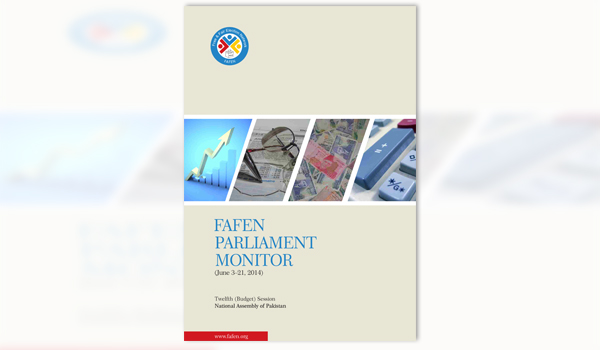The National Assembly’s twelfth (budget) session was marked by the approval of the federal budget for the fiscal year 2014-15. The House passed the Finance Bill after incorporating 43% of the recommendations proposed by the Senate. Other legislations, including the Anti-terrorism (Amendment) Bill 2014, were also passed amid protests and low attendance of members.
The session, comprising 14 sittings, started with the introduction of the Finance Bill in the first sitting. As many as 140 out of 340 lawmakers (41%) participated in the general discussion on the budget. Although nearly the same number of members had debated the budget last year, the discussion consumed 60% of the session as compared to 38% last year. A change in trend was witnessed as women parliamentarians spoke more actively in proportion to their strength in the House – 35 (58%) female MNAs shared their views on the Finance Bill as compared to 105 (39%) male members.
The lawmakers criticized the ruling PML-N for its poor performance in the first parliamentary year, presenting inaccurate figures of economic growth, adopting regressive tax policies and unequal distribution of resources among the federating units. However, government allies raised their voices in support of the government for preparing an efficient budget despite rigorous economic challenges.
The National Assembly incorporated 57 out of 133 recommendations proposed by the Senate in the final consideration of the Finance Bill – more than twice the recommendations approved last year (21 out of 113, or 18.6%). Likewise, the Opposition members were more active in the scrutiny of the bill compared to the previous year as they submitted 978 cut motions (compared to 770 last year) against 72 demands for grants (as opposed to 53 last year). However, none of the cut motions gathered a large number of votes and were rejected as the ruling party holds the majority of the House.
Additionally, the House approved the supplementary demands for grants and appropriations for the financial year 2013-2014; excess demands for grants and appropriations for the years 2004-2005, 2006-2007 and 2007-2008; schedule of authorized expenditure 2014-15; supplementary schedule of authorized expenditure 2013-14; and excess schedule of authorized expenditure 2004-05, 2006-07 and 2007-08.
In the wake of political leadership stressing for electoral reforms, the National Assembly approved a motion to form a committee comprising members of all parliamentary parties in the 12th sitting.
The House passed three treasury-backed legislations, including an amendment to the Anti-Terrorism Bill 1997. Additionally, the Legal Practitioners and Bar Councils (Amendment) Bill 2014 and the Service Tribunals (Amendment) Bill 2014 were also given a nod from the legislators. The House adopted six resolutions appearing on supplementary agenda. These resolutions condemned the terrorist attacks on pilgrims in Taftan (Balochistan) and at the Karachi airport as well as the attack on an MQM lawmaker Tahira Asif in June 2014. On other resolutions, the House commended the government’s decision to launch a military offensive in North Waziristan Agency; paid tribute to former Prime Minister Benazir Bhutto on her birth anniversary and resolved to extend the Federal Judicial Academy (Amendment) Ordinance 2014 for another 120 days.
The House conducted two debates in addition to budget deliberations that lasted five hours and 43 minutes. The first debate was on the terrorist attacks at the Karachi airport and on Shia pilgrims near the Pak-Iran border while the second dealt with the Zarb-e-Azb operation in North Waziristan Agency.
The question hour was held in only one sitting as budgetary considerations resulted in suspension of question hours in the remaining sittings. As many as 33 members (17 male and 16 female) submitted 63 questions, of which 52 were fully answered. PML-N members submitted 25 questions, followed by members of PTI (16), PPPP (nine), MQM (six), JI (five) and JUI-F (two). Additionally, two CANs moved to highlight water scarcity and shortage of teachers in Islamabad in the second sitting were left unaddressed.
The parliamentarians raised 110 POs which consumed 5% of the session’s time. As many as 31 POs were raised on law and order, while 22 dealt with the 2014-15 Budget. The session lasted 83 hours and 28 minutes. On average, each sitting started 32 minutes late and lasted for nearly six hours. The members’ attendance remained low as 67 MNAs were seen at the outset and 72 at the end on average. The Prime Minister was present in six out of 14 sittings, while the Finance Minister attended 10 sittings and remained present on the floor for 30% of the sessions’ time.
On the other hand, the Leader of the Opposition attended the entire session. The Chairman presided 52% of the session, while the Deputy Speaker chaired 31% of the proceedings. Nearly 6% of the session was presided by the Panel of Chairpersons, while the remaining time was consumed in prayer breaks.
The presence of parliamentary leaders showed considerable variance – with the JI leader attending 13 sittings followed by leaders of PkMAP (11), MQM (nine), PML-F (seven), ANP (six), NPP and PML (four each), JUI-F (three) and PTI (two). Among single member parties, AMLP and APML members were seen in eleven sittings, followed by QWP (10), BNP (nine), PML-Z (eight) and AJIP and NP (four each).
FAFEN observes the MNAs’ participation against three categories; lawmakers who submit agenda, those who debate it and members who participate in both activities. As many as 180 members (53%) participated in the House proceedings – 24 submitted agenda items, 69 took part in the House deliberations while 87 participated in both activities.
For complete report click here









